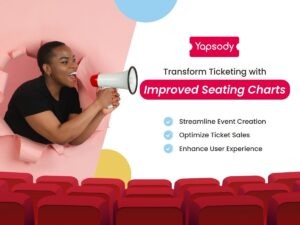Seating arrangements play a crucial role in shaping the overall experience of an event. Whether it’s a concert, theater show, sports event, or corporate seminar, an optimized seating layout ensures that attendees enjoy the best possible view while maximizing ticket sales. However, one common issue that event organizers face is the problem of orphan seats—single, unoccupied seats scattered throughout the venue due to inefficient booking patterns.
Orphan seats not only affect the attendee experience but also result in lost revenue. This blog explores how event organizers can optimize seating arrangements to eliminate orphan seats, boost ticket sales, and improve the overall event experience.
What Are Orphan Seats?
Orphan seats are single, isolated seats left unfilled due to inefficient ticketing patterns. This often happens when attendees purchase tickets in pairs or groups, leaving a lone seat between occupied ones. These single-seat gaps are difficult to resell, leading to suboptimal venue occupancy and lost revenue.
For example, imagine a group of three friends booking tickets in a row of four seats. The remaining single seat becomes an orphan seat, as most attendees prefer purchasing tickets in pairs or larger groups. Since few people attend events alone, this seat may remain unsold, creating an avoidable gap in your seating plan.
Why Orphan Seats Are a Problem
Orphan seats pose multiple challenges for event organizers, including:
- Reduced Ticket Sales: Since single seats are harder to sell, they may remain vacant even when the rest of the venue is full.
- Decreased Revenue: Unsold seats mean lost revenue opportunities, especially for premium sections where every seat counts.
- Poor Audience Experience: Empty seats can disrupt the ambiance and energy of an event, making the venue look less crowded than it actually is.
- Frustrated Attendees: Some attendees may end up with an orphan seat due to a lack of better options, affecting their overall event experience.
How to Optimize Event Seating and Eliminate Orphan Seats
To ensure a fully occupied venue and maximize ticket revenue, event organizers need to implement smart seating strategies. Here are some effective solutions:
1. Use Intelligent Seat Mapping
Advanced ticketing platforms like Yapsody offer smart seat mapping tools that prevent orphan seats. By configuring seat selection rules, event organizers can ensure that attendees only have the option to purchase seats in patterns that prevent single-seat gaps.
2. Enable Auto-Suggestions for Best Seats
Many ticketing systems allow event organizers to implement an auto-suggest feature that recommends optimal seating arrangements. This ensures that ticket buyers are guided toward purchasing seats in a way that minimizes orphan seats.
3. Restrict Single Seat Selection Gaps
One of the most effective ways to eliminate orphan seats is by using a single-seat restriction rule. This feature prevents attendees from selecting seats that leave an isolated one-seat gap between bookings.
For example, if an attendee selects two seats in a row of five, leaving a single seat between their selection and the next booking, the system can prompt them to adjust their selection or choose a different row.
4. Implement Dynamic Pricing for Orphan Seats
If orphan seats are inevitable, a dynamic pricing strategy can help make them more attractive to buyers. Offering discounted rates for single seats encourages solo attendees to book them, ensuring that every seat is filled.
For example:
- Offer discounted last-minute deals for single seats.
- Bundle orphan seats with exclusive perks like free drinks or merchandise to entice buyers.
5. Encourage Group Bookings
Promoting group discounts and bundled ticket offers can encourage attendees to book tickets in even numbers, reducing the chances of orphan seats forming. Consider offering deals such as:
- Buy 3 tickets, get 1 free.
- Discounts for group bookings of 4 or more.
6. Use Real-Time Seating Analytics
Event organizers can leverage real-time seating analytics to monitor booking patterns and adjust pricing or availability accordingly. Yapsody’s ticketing platform provides insights into seating trends, helping organizers make data-driven decisions that minimize seat gaps.
7. Allow Flexible Seat Swaps
Giving attendees the option to swap their seats for better placement can help fill orphan seats more effectively. A flexible exchange policy allows ticket buyers to adjust their seats closer to the event date, ensuring a fuller and more optimized seating arrangement.
Conclusion
Orphan seats can significantly impact ticket sales and event revenue. However, with the right strategies—such as intelligent seat mapping, auto-suggestions, single-seat restrictions, dynamic pricing, and real-time analytics—event organizers can optimize seating arrangements and maximize occupancy.
By leveraging Yapsody’s advanced ticketing solutions, event planners can ensure that every seat is filled efficiently, providing both financial benefits and an improved experience for attendees. Don’t let orphan seats hinder your event’s success—optimize your seating strategy today!









